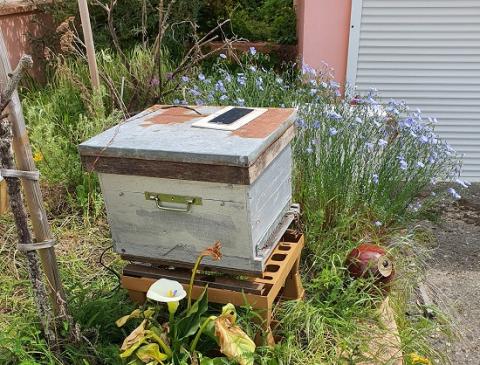
Open Hive: Polytech students fly to the rescue of bees
On May 24, students from the Polytech Sorbonne engineering school presented several of their research projects to some thirty industrialists. Among them, Yann Douze's fourth year students in electronics and computer science, and their connected beehive project: Open Ruche.
Yann Douze has been an associate professor at Polytech Sorbonne for the past twenty years, and is responsible for the electronics and computer science for embedded systems specialization. For the past two years, with the help of Sylvain Viateur, an engineer from the electronics platform, he has been helping fourth-year students design a complete embedded system for their connected beehive project.
How did this idea come about in the professor's mind? He explains, "I have been beekeeping as a hobby for five years and I own three hives. I've always been curious about how bees live and work in their habitat, so curious that I even tinkered with weight sensors for my hives. I thought this would be a great project for my students."
Open Ruche aims to collect the information emitted by the hives in order to respond to the problems faced by bees and, by analogy, beekeepers. And these are numerous:
- - Climate change and unstable weather (periods of great drought, disrupted seasons);
- - Pesticide poisoning;
- - Hive thefts, more and more frequent;
- - The proliferation of the varroa mite, a parasitic mite that carries a highly contagious virus;
- - The invasion of the Asian hornet, which kills, scares and stresses the bees.
About fifteen hives already monitored
"All these factors weaken bees and their honey production. The Open Hive system tries to find solutions by studying the hives and the behavior of their tenants. It collects data that will generate SMS or e-mail alerts sent to beekeepers," explains Yann Douze.
To this end, the first two classes of Polytech Sorbonne students had to work on the design of several sensors: weight, luminosity, temperature and humidity. "Next year, the new fourth-year students will work on a sensor that will analyze the sound frequencies of bees in the hive," says Yann Douze.
To test the feasibility of the project, the students deployed the sensors on 15 hives in the city of Plaisir's school apiary in the Yvelines. "This is typically a participatory research project that "connects" students, teachers and beekeepers together." And the professor concludes: "Open Ruche is also fully integrated into Polytech Sorbonne's DD&RS* strategy."
Will the future of bees and beekeepers be in the connected hive?
*Stainable Development and Social Responsibility
Connected hives have a cost
If many amateur beekeepers are interested in such systems, the price of connected hives available on the market is far too high (between €300 and €800).
"With Open Hive, the idea is also to offer an open source software that beekeepers can use as they wish and set up according to their needs, at no cost", explains Yann Douze. "This software will allow them to check if there is a good honey flow thanks to the weight sensor for example or if the bees are not stressed or disturbed in any way."
